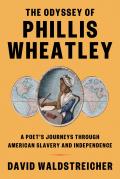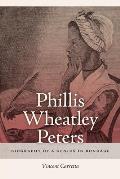Two Wheatley Biographies, Compared and Contrasted
The Los Angeles Review of Books just ran Hollis Robbins’s assessment of what the headline calls “Two New Books About Phillis Wheatley.”
One of those books is David Waldstreicher’s The Odyssey of Phillis Wheatley, published earlier this year. The other is the new edition of Vincent Carretta’s biography, originally titled Phillis Wheatley in 2011 and now revised and expanded as Phillis Wheatley Peters.
By some measures Carretta’s book wouldn’t count as new, though it certainly has new material. Its inclusion in this review not simply as a foil for Waldstreicher’s book but in sharing the spotlight seems to reflect how Robbins, dean of humanities at the University of Utah, prefers Carretta’s approach:
Here are extracts from that contrast:
Now as I read Waldstreicher’s endnotes about that early poem, he identifies Coffin not as Nathaniel Coffin of Boston but as Richard Coffin of Nantucket—and I found that identification convincing. Did Richard Coffin enslave people? I don’t know. He’s not as well documented as the rich merchant from Boston, but there’s no evidence that merchant was in danger of drowning in September 1767.
Carretta’s connection between “On Messrs. Hussey and Coffin” and slaveholding thus seems more strained than Waldstreicher’s linkage of maritime danger and the teen-aged Phillis’s memory of her own Atlantic crossing. And that assessment is based on researching the historical context of the event, which is indeed Carretta’s strong point but which Waldstreicher has managed as well.
One of those books is David Waldstreicher’s The Odyssey of Phillis Wheatley, published earlier this year. The other is the new edition of Vincent Carretta’s biography, originally titled Phillis Wheatley in 2011 and now revised and expanded as Phillis Wheatley Peters.
By some measures Carretta’s book wouldn’t count as new, though it certainly has new material. Its inclusion in this review not simply as a foil for Waldstreicher’s book but in sharing the spotlight seems to reflect how Robbins, dean of humanities at the University of Utah, prefers Carretta’s approach:
Getting to know Wheatley via Carretta means being immersed in the material facts of life of one portion of the globe between the years 1750 and 1800: colonial America, the slave trade, shipping lanes and trade between Europe and the colonies, merchant and church life in Boston, what books were available, who read what, and what political revolutions were brewing. . . .As examples of the different approaches, Robbins presents passages showing how the two books discuss the same subjects. One of those is the poem “On Messrs. Hussey and Coffin,” which I discussed last month.
Getting to know Wheatley via Waldstreicher is far easier—his book brings Wheatley to the present and to present-day readers, presuming that she would think and speak as we think and speak. . . . He offers a Phillis Wheatley ready for her TikTok close-up.
Here are extracts from that contrast:
When, nearly 70 pages in, Carretta’s readers finally get to Wheatley’s first published poem, “On Messrs. Hussey and Coffin” (1767), about a schooner laden with whale oil that survived the most terrible gale in memory, sufficient details about the key players (Nathaniel Coffin was an Anglican Boston merchant and an enslaver of a young girl named Sappho while Hussey was one of several sons of a prominent and prosperous Nantucket Quaker merchant and owner of whaling vessels) have been offered to support Carretta’s claim that “Phillis was already commenting on transatlantic economic and political subjects by the time she was about fifteen years old.” . . .Later in the review Robbins brings in a third author, of sorts. She asked ChatGPT’s GPT-4 “what might modern readers assume Phillis Wheatley was thinking when she wrote ‘On Messrs. Huffey and Coffin’ in 1767.” This appears to be a way to saying that even a machine can make assumptions about Phillis Wheatley’s thoughts and feelings, with the tacit implication that Waldstreicher’s book may do that in a more convincing (and better written) way but Carretta’s “careful archival research and scrupulous historical accuracy” is more valuable.
Waldstreicher opens his book with this very poem, to begin his argument that Wheatley’s poetic expressions must be a matter of what she personally experienced and felt. . . . [W]hile it is not at all wrong to wonder whether the trauma of the poet’s Middle Passage sparked her drive to write so forcefully and so well, it is a question, not a certainty. . . . But Waldstreicher’s readers don’t really have a choice to agree or not with his conjectures and conclusions that “On Messrs. Hussey and Coffin” was more about Wheatley than about Hussey and Coffin. Waldstreicher does not mention that Coffin was an enslaver in talking about the poem. An endnote disputes Carretta’s claim, saying that “there were many Coffins and Husseys” in the area. But shouldn’t readers be told it is a possibility?
Now as I read Waldstreicher’s endnotes about that early poem, he identifies Coffin not as Nathaniel Coffin of Boston but as Richard Coffin of Nantucket—and I found that identification convincing. Did Richard Coffin enslave people? I don’t know. He’s not as well documented as the rich merchant from Boston, but there’s no evidence that merchant was in danger of drowning in September 1767.
Carretta’s connection between “On Messrs. Hussey and Coffin” and slaveholding thus seems more strained than Waldstreicher’s linkage of maritime danger and the teen-aged Phillis’s memory of her own Atlantic crossing. And that assessment is based on researching the historical context of the event, which is indeed Carretta’s strong point but which Waldstreicher has managed as well.



No comments:
Post a Comment